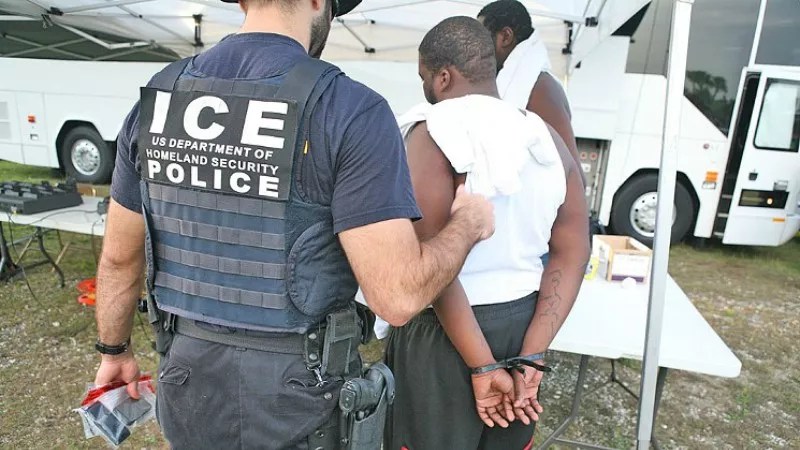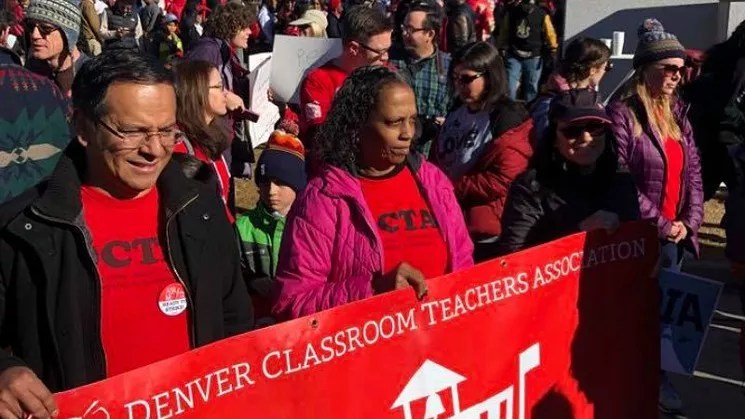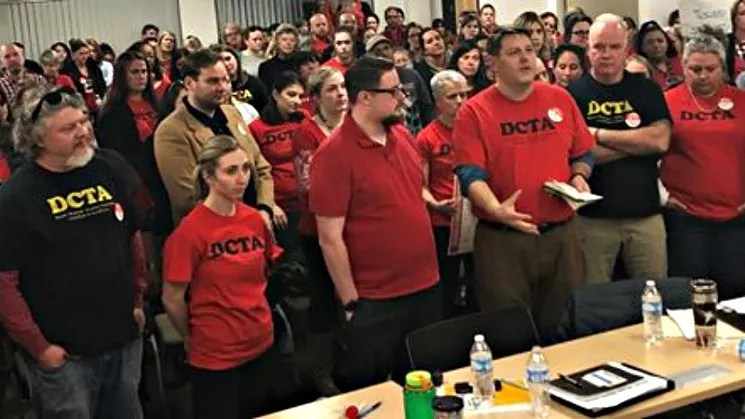
ice.gov

Audio By Carbonatix
In the wake of a strike vote by 93 percent of Denver Classroom Teachers Association union members, a representative of Denver Public Schools sent a letter maintaining that DPS was legally obligated to report any striking teachers on work visas “to immigration and the US Department of State.”
The text of the letter, originally posted by the Colorado People’s Alliance, is on view below.
Within hours of the letter appearing online January 24, DPS spokeswoman Anna Alejo characterized it to local media as an “incorrect communication,” insisting that “DPS will not be collecting information or reporting information to immigration…or the U.S. Department of State about any individuals’ decision to strike or not strike. We will work to correct this misunderstanding immediately.” Twice, she offered the district’s deepest apologies “for any anxiety that was caused by this error.”
The letter’s release is the second major communication gaffe by DPS during the brief tenure of new superintendent Susana Cordova. On January 6, a robocall incorrectly told some parents the wrong day for their kids to return to school. As a result, attendance in a number of DPS classrooms on January 7, Cordova’s first official day on the job, was down by 25 percent or more.
The Colorado People’s Alliance describes itself as “a racial justice, member-led organization dedicated to advancing and winning progressive social change locally, statewide and nationally. COPA builds power to improve the lives of all Coloradans through leadership development, organizing and alliance building.”

DCTA members at this week’s Marade, the Denver parade honoring the late Martin Luther King Jr.
The introduction to its post with the letter, which went live at 5:57 p.m. on January 24, reads: “DPS sent out an email to a school saying they have to report some immigrant teachers (those with a visa) to the government if they choose to strike – that’s NOT RIGHT! If DPS claims to want to welcome and protect their immigrant students, why are they lying to and intimidating their immigrant teachers about their right to strike?? Tell your school board member and Superintendent Susana Cordova to set the record straight and to stop intimidating immigrant educators! #DCTAStrong #RedForEd.”
Here’s the text of the letter:
Hello,
I’ve identified your schools as having teachers currently on a work visa. I know that some of them have been asking you if they can strike. In the event that you have teachers on H or J visas that choose to strike, they are allowed to do so, but we need to be informed as soon as possible as we are required to report that to immigration and the US Department of State. If they have a pending case and choose to strike, this could impact the decision on the case.
However, because each situation is very personal and nuanced, I would advise any teacher inquiring about their personal situation to contact the immigration attorney or Yvette Morales…directly, as they should seek advisement directly from the attorney. As a school leader, please do not counsel or provide any advice to an employee about their immigration case. You may also not use this information to discourage anyone from going on strike, but rather you should direct them to the appropriate individuals if they have questions.
These are delicate conversations, please let me know if you need any guidance or talking points if you have visa staff asking questions about how the strike may impact their status.
Taylor Tancik
Human Resources School Partner
Human Resources Strategic Support Team
1860 Lincoln St., Denver, CO 80203
According to her LinkedIn page, Taylor Tancik has worked at DPS since last July. She graduated with distinction from the University of Colorado Boulder, earning a degree in International Spanish for the Professions, and is listed as a candidate for a Master in Public Administration at the University of Colorado Denver. She previously worked at the Denver Language School, first as a Spanish teaching assistant and later as a business manager. A website called Taylor in Chile commemorating her trip to South America in 2010 lingers online.
The documents alluded to in the letter are more specifically known as J-1 and H-1B visas. A J-1 visa is a non-immigrant visa category for people who win permission to take part in visitor-exchange programs based on work and study. Individuals with an H-1B visa can be hired by employers in the U.S. under an exception for foreign workers in what are described as “specialty occupations” – jobs that require a bachelor’s degree or a work-experience equivalent.

Members of the DCTA negotiating team.
In her note to the media, DPS’s Alejo makes no reference to J-1 visa holders. However, she points out that the district’s immigration law firm, Kolko & Casey P.C., has posted a guideline for those with H1-B visas. (We’ve reproduced it at the bottom of this post.)
The DCTA hasn’t commented on the letter on its Facebook page. But the comments on the Colorado People’s Alliance Facebook address are harsh. One person summed up the missive with this: “Despicable. I thought better of Colorado.”
Teachers could technically strike as soon as Monday, January 28, but given the district’s request for intervention from Governor Jared Polis and the Colorado Department of Labor, a delay is inevitable.
Continue reading for the Kolko & Casey item about H1-B visas.
Generally speaking, in order to maintain valid H-1B status in the United States, an H-1B employee is required to remain employed with her H-1B employer, under the terms set forth in the H-1B petition. In the absence of a strike, a failure to remain employed can be considered a violation of H-1B status.
However, in the event of a strike, an employee currently employed in valid H-1B status will not be considered in violation her H-1B status if she chooses to participate in a strike.
Critically, the H-1B employee may not otherwise violate her H-1B status, for example by engaging in employment with employers during the strike.
Responsibilities of H-1B Employers
An employer sponsoring H-1B Specialty Occupation Workers makes certain representations and attestations to two federal agencies: The Department of Labor (DOL) and the Department of Homeland Security (DHS). In the event of a strike or lockout, an H-1B employer is obligated to notify the DOL of the strike.
Each H-1B Petition that is filed with the DHS must include a Labor Condition Application (LCA) that has been certified by the DOL for the three-year H-1B period. With the filing of each LCA, the employer confirms that there is no strike or lockout in the same occupational classification and in the area of employment.
Because the employer must confirm that there is no strike or lockout at the time of the filing of the LCA with the DOL, an employer cannot file new LCAs to support new H-1B petitions during a labor strike.
In the event of a labor strike, for all employees that are currently in H-1B status (and therefore under a certified LCA) the employer is required to notify the DOL in writing of the strike within three (3) business days. A failure by the employer to timely notify DOL of a strike may result in monetary sanctions for each violation.
Once the DOL has been notified of the strike, it may choose to consult with the relevant Labor Union, and may also inform the DHS of the strike.
Upon receiving notice from DOL of a strike, DHS may choose to deny H-1B petitions that are currently pending before the agency. DHS may also choose to deny admission to individuals seeking to enter the USA from abroad on an H-1B visa.
Critically however, employees who are already working on approved H-1B status cannot have their H-1B status revoked by DHS simply because there is a labor strike.
We understand that labor strikes can be challenging for employers and employees alike.